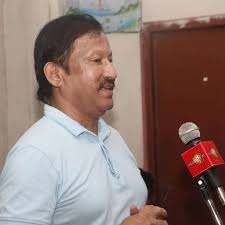-By LeN Colombo Correspondent

(Lanka-e-News -05.May.2025, 11.05 PM) In a city where protests are as routine as monsoon rains and slightly less effective than public transport, last week’s sudden gathering outside the Pakistan High Commission in Colombo raised more than a few diplomatic eyebrows—and now, financial suspicions.
At the heart of the drama: Prabha Ganesan, a name that rings a distant echo of relevance in Sri Lankan politics, better known as the brother of the slightly-more-successful-but-equally-obscure Mano Ganesan. But if insiders are to be believed, this was not your ordinary rabble-rousing. It was a commissioned production—paid for, staged, and applauded in the corridors of the Indian High Commission.
According to highly-placed leaks (of the kind that mysteriously appear whenever a few million rupees change hands), Prabha was allegedly handed a cool Rs. 10 million by the Indian High Commission to orchestrate a modest street protest against Pakistan. The reason? Nobody knows. Maybe New Delhi wanted to teach Islamabad a lesson. Maybe they just got bored. Or maybe it was simply Thursday.
The protest was a peculiar affair. Witnesses recall three-wheelers weaving through Mattakkuliya’s labyrinthine lanes, scooping up unsuspecting bystanders and shipping them to the High Commission gates with promises of lunch and "a small something for the trouble." Most of the participants, observers noted, were from Colombo’s Indian Tamil community—descendants of plantation workers who had traded the hills of Hatton for the housing crises of Slave Island.
Irony, as always, was not in short supply. For decades, both Prabha and Mano Ganesan held ministerial posts, built political careers, and waxed lyrical about uplifting the very people they now allegedly recruited for a paid spectacle. But social upliftment, as it turns out, takes a back seat when ten million rupees knock at the door.
“None of them built even a single decent house for their community when in power,” says a local community leader. “But suddenly, they can arrange 50 vans, 100 tuk-tuks, and bottled water for a protest? That smells more like coriander than conviction.”
More intriguing is the new wrinkle: under Sri Lanka’s latest diplomatic protection laws, organizing politically motivated demonstrations outside foreign missions—especially in exchange for foreign cash—is now squarely in criminal territory. If proven, this little affair could be less about slogans and more about subpoenas.
Yet neither Prabha nor Mano Ganesan have commented. Their offices were "unreachable for comment," which in Colombo politics usually means, “we’re hiding and lawyering up.” Meanwhile, the Indian High Commission has issued its usual bland denial, which sounded suspiciously like “we deny everything and also nothing.”
“This is a serious breach,” one retired diplomat whispered. “It is not a protest. It’s a performance—funded by a foreign mission. What next? Flash mobs outside the Chinese embassy over dumplings?”
Critics say this is yet another reminder of the deeply transactional nature of Sri Lankan politics. For some politicians, the only real ideology is money, preferably in bundles and delivered on Fridays. And for certain political families—such as the Ganesans—the community they claim to represent has long become an ATM: politically useful during elections, dispensable thereafter.
“This isn't activism. It's puppetry,” said a senior lawyer. “If true, Prabha Ganesan and those behind him should be hauled before the CID, not because they hate Pakistan, but because they sold their protest like a sponsored YouTube video.”
Now, murmurs are growing about a full-scale investigation, with calls for the CID to trace the alleged money trail from the corridors of the Indian High Commission to the picket signs flapping on Bauddhaloka Mawatha.
For now, the Ganesan brothers remain comfortably silent—cozily ensconced in their affluent residences, far removed from the shanties of the Indian Tamil voters who were once again used as props. The irony is that while many of those protesters returned to homes without electricity, their organisers may have walked away with electricity bills paid for the next decade.
In the end, this might not just be a scandal. It might be a template.
Because in Sri Lanka, politics is not about who serves the people, but who serves the biryani at the protest.
-By LeN Colombo Correspondent
---------------------------
by (2025-05-05 18:45:05)
Leave a Reply